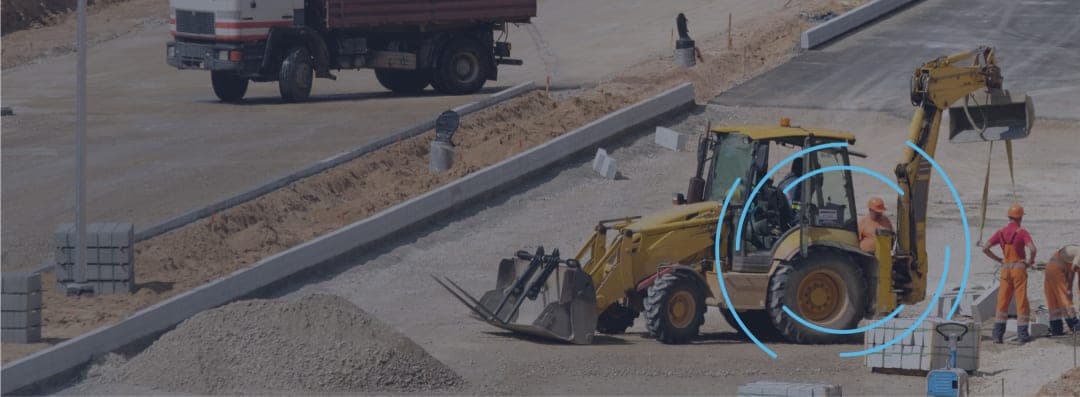Although GPS tracking can be useful in a variety of industries, the benefits and return on investment are particularly apparent in construction. Generally speaking, industries can track and identify assets in real-time using GPS tracking technology, which helps them function more effectively and profitably.
One of the most complex parts of running a construction company is managing its equipment and resources. GPS technology makes this process easier, cost-effective, and more seamless.
Why your construction business needs a GPS tracking solution
It’s no secret that in the construction business, you manage a lot of paperwork and back and forth phone calls when it comes to your equipment. This includes getting updates from workers or supervisors in the field regarding location and ETAs of equipment. Managers also have to manually calculate distances, periods, and fuel consumed, among other figures – which is even more time-consuming when done manually.
However, GPS tracking has made work much easier for them. Aside from navigation, GPS tracking for businesses –especially construction also features fleet, asset, and equipment tracking management software. A software tool collects, analyzes, and charts GPS data for a more intuitive presentation. You can track individual equipment in real-time and view its status on a dashboard.
4 benefits of GPS tracking for construction
Tracking equipment also makes it easier for the company to monitor its employees remotely and assess their behavior accurately. Installing a GPS tracker on a delivery truck, for example, is a cost-effective approach to assure on-time deliveries and safe driving.
This post covers the top 4 benefits of GPS tracking for construction companies every stakeholder in the industry should know. Let’s take a closer look.
1. Increased workplace productivity and efficiency
According to a 2020 National Construction Payment Report, as many as 70% of the projects fail, run over budget, or go past deadlines. Unsurprisingly, the main reason for these problems is logistical or difficulty in managing and tracking workers and equipment.
Planning logistics and streamlining operations are very important benefits. It makes it practical to plan the most efficient routes for drivers and make unused equipment available in other locations as required. You can even detect if the car is on its way to its destination, which routes it took, and when it is resting.
Unauthorized usage of work cars is, unfortunately, more widespread than most people would want to acknowledge. GPS tracking assists management in keeping staff on task and focused on your business rather than their own or someone else’s. You can use powerful alerting and reporting tools to detect when an employee is undertaking personal errands or side jobs during the workday. This will eventually keep your personnel productive for your company every day.
2. Improved worker and equipment safety
GPS tracking is a handy tool to monitor the driving habits of workers. The right GPS tracking system may feature real-time reports and programmed notifications to help keep track of vehicles on the road and on project sites. Poor driving habits such as idling, careless speeding, and diversions contribute to high maintenance and liability expenses for a construction company. A GPS tracker can help management identify poor drivers for coaching or dismissal with reliable GPS data to back up any disciplinary action.
GPS tracking is also used to manage fleets and ensure efficient dispatching remotely –making the dispatching and monitoring equipment more convenient and safe. This feature is particularly beneficial when the company runs multiple projects in different locations and needs to plan vehicles and equipment to be used in various sites.
Finally, one of the most notable ways construction companies use GPS to promote worker safety is to streamline insurance filing with better in-depth reports. This will go a long way to reducing road and construction site accidents.
3. Minimize fuel and operation costs
A construction company must keep its expenses at a minimum to maximize its profits. However, fuelling and maintaining the high-powered and heavy vehicles and equipment can be quite costly. Wastefulness through unsafe driving habits, excessive idling, and taking longer or busier routes contribute to the high costs of fuel and projects.
GPS tracking can pinpoint the exact location, direction of movement, and speed of a vehicle. Then, management can use this information to identify problems that may lead to high fuel consumption and more time wasted with greater ease. The company can optimize routes and transportation times with proper planning to achieve a better fuel economy.
Managers can also use GPS tracking to optimize fleet maintenance schedules. Poor vehicle maintenance often leads to higher fuel consumption and breakdowns that waste time and cause higher repair costs. Management can use GPS that connects to vehicle diagnostics to proactively identify necessary minor repairs before they become more serious problems. The money saved by preventive maintenance will help the company keep operating costs lower.
4. Locate, track, and recover stolen equipment
The final key benefit of GPS tracking is the layer of security it adds to equipment. Construction equipment is typically heavy and expensive. Theft and losses are major risks that should be prevented where possible. However, theft of construction equipment and vehicles is rampant and continues to be a big problem for companies. GPS tracking is foolproof asset protection that can help pinpoint the location of the stolen equipment.
Today, many construction companies install GPS trackers in their vehicles and heavy equipment and then set alerts when they are moved outside a specified area or during off-work hours. This measure helps secure the equipment and vehicles and helps keep their insurance rates lower.
GPS & asset tracking software for construction
As you can see, there are many benefits of using a GPS tracking solution in the construction industry. For example, tracking real-time position, leading truck drivers, saving time, and providing alerts in suspicious situations.
If you invest in construction asset tracking software, you will be able to record data such as service dates, when components need to be replaced, and any tool defects. Some GPS trackers can monitor engine hours, mileage, and vibration levels, giving you a better indication of when it’s time to service your equipment.
Spytec ensures that you can check the location of your vehicles and assets from anywhere with only a few taps or clicks. View tracker location data from almost any device and select from a number of subscription options.
Request a demo of GPS tracking to learn more about how it would streamline operations in your construction company.

